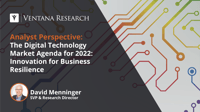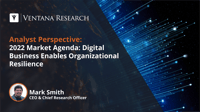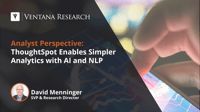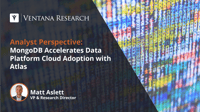I’m proud to share Ventana Research’s 2022 Market Agenda for Digital Technology. Our focus in this agenda is to deliver expertise to help organizations prioritize technology investments that increase workforce effectiveness and organizational agility, ensuring ongoing operations during any type of disruption.
Read More
Topics:
Analytics,
Cloud Computing,
Internet of Things,
Data,
Digital Technology
Ventana Research is sharing insights gleaned from our latest Value Index research, an assessment of how well vendors’ offerings meet buyers’ requirements. The Ventana Research Value Index: Agent Management 2022 is the distillation of a year of market and product research by Ventana Research. Drawing on our Benchmark Research, we apply a structured methodology built on evaluation categories that reflect the real-world criteria incorporated in a request for proposal to customer experience vendors...
Read More
Topics:
Customer Experience,
Voice of the Customer,
Contact Center,
Product Information Management,
Digital Commerce
With the announcement of Ventana Research’s 2022 Market Agenda, our expertise in Digital Business continues to advance the market need for effective investments into technology, and I will outline here the key areas of focus to provide insights to organizations that can increase their organizational resilience and workforce readiness. We are proud to provide expertise on ensuring technological effectiveness through our market research and experience in providing guidance on trends and best...
Read More
Topics:
Performance Management,
Business Continuity,
Governance, Risk & Compliance (GRC),
Digital transformation,
Digital Business,
Digital Security,
Digital Communications,
Sustainability Management,
Work Management,
Experience Management
Ventana Research was the first market research firm to focus on the emerging area of sales performance management (SPM), which we define as a coordinated set of sales-related activities, processes and systems that enable organization. Over the past decade, SPM has become more science than art. Properly managing a sales organization requires effective planning, which in turn requires key performance and sales indicators built on a foundation of relevant metrics. But this is changing. As more...
Read More
Topics:
Sales,
Sales Performance Management,
Revenue Management,
Sales Engagement
The necessity of learning is essential for every organization to realize the full potential of the workforce. But many organizations treat learning like training or academic instruction to ensure policy or compliance to a minimum level of work performance, instead of continuing career education and improving skills in the operational workflow. The context for where and how workers work is critical to ensure that on-the-job learning is possible. While traditional learning management systems...
Read More
Topics:
Human Capital Management,
Learning,
LMS,
Digital Business,
inkling,
LXP
The 2022 Ventana Research Value Index for agent management software is published, offering interesting observations about how the market is advancing to provide more sophistication to agents and the management of them. The market is now characterized by applications integrated into multifunction suites, a significant change accelerated by the pandemic in the short term and vendor consolidation over a longer period. The core applications — workforce management scheduling, call recording and...
Read More
Topics:
Customer Experience,
Voice of the Customer,
Contact Center,
Product Information Management,
Digital Commerce,
Subscription Management,
agent management
As with many IT innovations, augmented reality (AR), extended reality (XR) and the related topic of spatial computing had been discussed to death long before they became a practical reality. As a user interface, AR is already well understood in terms of its ability to open vast new vistas in entertainment as well as making physical tasks, such as machinery maintenance and warehouse pick-and-pack, far more efficient. In the case of spatial computing, by using glasses to superimpose workflow...
Read More
Topics:
Office of Finance,
Digital transformation,
natural language processing,
extended reality,
Digital Business,
robotic automation,
Collaborative & Conversational Computing
Ventana Research has announced its market agenda for 2022, continuing the tradition of reliability in our efforts to educate and guide the technology market. Our assessments are backed by our expertise and independence, as we do not share our market agenda or our research – including analyst and market perspectives or our Value Index – with any external party until it is published. We review and refine our market agenda throughout the year to ensure we offer the expertise and insights...
Read More
Topics:
Customer Experience,
Human Capital Management,
Marketing,
Office of Finance,
Analytics,
Data,
Digital Technology,
Operations & Supply Chain,
Digital Business,
Office of Revenue,
Market Agenda
Organizations today have huge volumes of data across various cloud and on-premises systems which keep growing by the second. To derive value from this data, organizations must query the data regularly and share insights with relevant teams and departments. Automating this process using natural language processing (NLP) and artificial intelligence and machine learning (AI/ML) enables line-of-business personnel to query the data faster, generate reports themselves without depending on IT, and...
Read More
Topics:
embedded analytics,
Analytics,
Business Intelligence,
Data Integration,
Data,
natural language processing,
data lakes,
data operations,
AI & Machine Learning,
data platforms
Few trends have had a bigger impact on the data platforms landscape than the emergence of cloud computing. The adoption of cloud computing infrastructure as an alternative to on-premises datacenters has resulted in significant workloads being migrated to the cloud, displacing traditional server and storage vendors. Almost one-half (49%) of respondents to Ventana Research’s Analytics and Data Benchmark Research currently use cloud computing products for analytics and data, and a further...
Read More
Topics:
Analytics,
Business Intelligence,
Data Governance,
Data Integration,
Data
Organizations today are working with multiple applications and systems, including enterprise resource planning (ERP), customer relationship management (CRM), supply chain management (SCM) and other systems, where data can easily become fragmented and siloed. And as the organization increases its data sources and adds more systems and custom applications, it becomes challenging to manage the data consistently and keep data definitions up to date. This increases the need to use master data...
Read More
Topics:
Analytics,
Business Intelligence,
Data Governance,
Data Integration,
Data,
Digital Technology,
Analytics & Data
The contact center is where much of customer experience management happens, but it is by no means the beginning or end of the CX story. Other departments, notably marketing and revenue, have a stake in what happens during the customer’s lifecycle. Whether it’s developing offers, orchestrating interactions or assessing behavior and intent, handling the complexity of the relationship requires a broad set of participants who are not always in alignment.
Read More
Topics:
Customer Experience,
Voice of the Customer,
Contact Center,
Customer Experience Management
Pricing is an issue that almost every for-profit company confronts – and usually agonizes over. Chief financial officers must play a part in setting the strategic direction of pricing in their organization. They should not be involved in tactical pricing decisions because they are not close enough to markets and customers, but they should be part of the strategic design of pricing, especially as part of a profitability management effort, which I’ve discussed before.
Read More
Topics:
Office of Finance,
Analytics,
Financial Performance Management,
Digital Commerce,
Digital Business,
Revenue Management,
Sales Engagement
The need for data-driven decision-making requires organizations to transform not only the approach to business intelligence and data science but also accelerate the development of new operational applications that support greater business agility, enable cloud- and mobile-based consumption, and deliver more interactive and personalized experiences. To stay competitive, organizations need to prioritize the development of new, data-driven applications. As a result, many have been encouraged to...
Read More
Topics:
Analytics,
Cloud Computing,
Analytics & Data
























